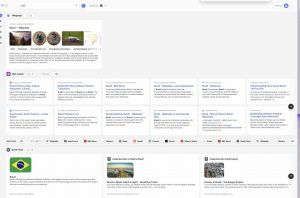This Movement initiated by Australia Forcing big tech, including Google, to pay for news to ensure the economic sustainability of professional journalism continues to expand into new countries.
On Wednesday, 11th, Alphabet’s research platform announced the signing of new agreements to pay content to more than 300 media companies in Europe in Germany, France and four other European Union markets.
Another innovation was the release of a tool that would allow tools to license excerpts from their articles to be displayed in searches, in accordance with European copyright legislation, via Google Search Console.
France becomes the first country to sign a major contract
The new deals come after the tech giant received a multimillion-dollar fine from the French government in 2021. He signed a contract with a group of journalism companies in the country in March. It is based on the provisions of European Union law created to protect the sector.
Three years ago, the EU passed new copyright rules, forcing major online platforms to pay journalists, media companies, writers, musicians and artists for the use and display of their work.
Sulina Connal, director of news and broadcast partnerships at Google, spoke about the negotiations in the EU.
“So far we have agreements covering more than 300 national, local and specialist publications in Germany, Hungary, France, Austria, the Netherlands and Ireland, and further negotiations are ongoing.”
Google’s new payment tool for news
He also announced the program Extended News Preview (ENP) is a Google attempt to meet the requirements of European copyright law.
“We are announcing the launch of a new tool to bid for thousands of news outlets that will be available to other European Union countries in the coming months, starting with Germany and Hungary.”
ENP will offer European media companies a news monitoring agreement that authorizes Google to display portions of text and clip art for a license fee.
read more
Can you face Google? New search engine challenges the giant with more privacy and “horizontal listing”
Google executive said in a statement that new rules on copyright in Europe allow search engines to link and use “very short pieces” of press content.
Connal also provides rights for media outlets if their content is viewed online for a longer period of time – “but without defining exactly what a short snippet or longer view is,” he says.
“Despite this uncertainty, we announced last year that we would pay news companies for content that goes beyond links and snippets, as we already do in countries like Germany.”
The ENP tool will be made available through Search Console, and media companies will contract with Google to monetize this content with information on what the content is, how it will be implemented, and how to provide feedback to the platform about the program.
“All offerings are based on consistent criteria that comply with law and current copyright guidelines, including how often a news site is viewed and how much advertising revenue is generated on pages that also display views of news content.”
Connal also points out that companies and media outlets continue to have full control over whether and how their content appears in Google search. “Publishers can change their preferences and enroll in the ENP program at any time,” he explains.
Google already pays for news in Australia
Despite the advances made in Europe, it was Australia. The first country to join the struggle is on the side of the journalists. Pass a law last year requiring Facebook and Google to pay for news uses.
The two digital media giants reacted, but eventually made multimillion-dollar deals with newspaper companies.
The initiative came as Prime Minister Scott Morrison’s government passed the first law in the country mandating digital platforms to negotiate with journalism companies over the use of the content they produce. Initially, the digital giants stood firm against the law.
But when the bill reached Parliament, Google was the first to sit down to draft and sign agreements even before the law took effect.
read more
News Corp and Facebook sign historic deal after enacting Australia’s new social media law
Facebook has even banned the sharing of links on its platform, and this has sparked worldwide revolt, including that the Government itself is covering its core services. But it eventually began talks with the federal government and even received some key concessions that were viewed by analysts as a weakening of the law.
According to the new rules already in effect in Australia, platforms can close deals directly. If they can’t agree, the journalism company defines a value by introducing an arbitration mechanism.
Canada also introduces bill for news use
In April, Canada also introduced a bill to compel big tech companies to make commercial deals with the media and compensate them for publishing excerpts from the stories.
The country’s proposal, dubbed the “Online News Act,” requires major technicians to make direct deals with newspaper companies, but foresees government intervention if there is no deal.
“The news industry in Canada is in crisis,” said Canadian Heritage Minister Pablo Rodriguez when presenting the bill.
The country’s parliament has scrutinized Australian laws to draft its own legislation aimed at mitigating the effects of the major tech revolution and the press industry of recent years.
More than 450 Canadian media outlets have closed since 2008, 64 of which have been in the past two years, the government said.
read more
Canada also wants to force Big Techs to pay for news
Google and Facebook profit—and a lot—from publishing content from major Canadian media outlets, but do not share ad revenue with them, according to the government’s assessment.
Rodriguez said the bill aims to resolve this “market imbalance”:
“More and more Canadians are turning to digital platforms as a gateway to find news content, and this online shift has had a strong impact on the business of the news industry.
“[As empresas] Keep sharing and distributing Canadian news content without paying.”
The text of the social media law presented in Canada’s parliament seeks to ensure that “the media and journalists receive fair compensation for their work,” according to a statement from the Heritage Ministry.
EU deal comes after French fine
The progress of negotiations between Google and European Union media companies came after the company was fined a millionaire from France.
in March, eight months after receiving 500 million euro fine in France, Google has reached an agreement with a newspaper alliance in the country and will begin paying publishers to view the content they produce in online searches.
The search giant and APIG (General Information Press Alliance (APIG)) issued a joint statement emphasizing that the agreement represents a “historic step in the enforcement” of the respective rights.
As in Australia, the two major digital media companies, Google and Facebook, have tried to resist pressure from the media industry, arguing that newspaper companies already benefit from exposure on platforms.
But the European Union bought the press fight in 2019 by creating a directive that unified copyright and related rights.
The first deal with APIG was signed in January last year, but Google was fined 500m euros for failing to negotiate in “good faith”, in the understanding of the French competition authority.
Negotiations resumed in September, and in early March a new deal was announced, benefiting nearly 300 national, regional and local newsgroups.
read more
source: Noticias


